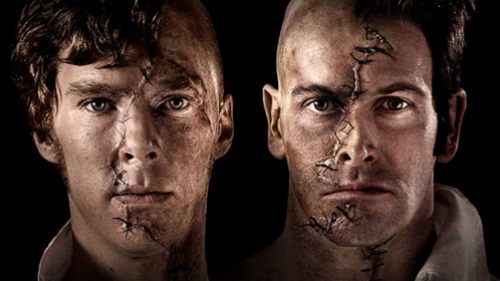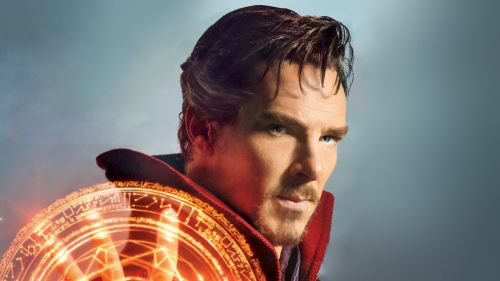THE CURRENT WAR: DIRECTOR’S CUT Review: Just Pull The Plug Already
Like the electric motor its characters strive to perfect, The Current War has three poles: genius huckster Thomas Alva Edison (Benedict Cumberbatch), principled entrepreneur George Westinghouse (Michael Shannon), and idealistic savant Nikola Tesla (Nicholas Hoult), each worthy of biopic treatment in their own right. Yet try as it might to bring these contrasting personalities and philosophies together to examine the tensions between invention, commerce and morality, the film fails to reach its potential.
The Current War opens on Edison demonstrating his newfangled electric lightbulbs to eager investors as Westinghouse awaits his own opportunity to buy into the “race to enter the modern world” that is the 1880s electrification of the USA. However, Edison blows off their meeting, the windows of his train offering only camera-shutter glimpses of the bemused Westinghouse and his wife Marguerite (Katherine Waterston) waiting for him at a station. Thus slighted, Westinghouse declares war and sets about building his own electric empire.
At least, that seems to be the gist: exposition in these early scenes is almost impossible to absorb in the face of the breathless first act’s continual barrage of roving camera, hyperactive editing, unmotivated Dutch angle, time-slicing and off-centre framing. The film eventually tires itself out and settles into a less-is-more visual language, but director Alfonso Gomez-Rejon (Me and Earl and the Dying Girl) isn’t entirely done with the bizarre shot choices and impossible long takes. The cumulative effect is eye-rollingly distracting and made all the more frustrating by Chung Chung-hoon’s luminous photography of the sumptuous production design’s cozy conspiratorial spaces, chilly laboratories and cityscapes suffused with the wonders of the age as new technology banishes the darkness. The visual storytelling does have its moments of clarity, though, particularly the inventively varied close-ups of red and yellow bulbs screwed into a wall-sized map charting the changing fortunes of the competing companies (all the actual combat as we get), and a delightful explanation of the practical difference between alternating and direct current which lies at the war’s heart.
Yet this key information isn’t revealed until an hour into the movie, symptomatic of a script which continually undermines the cast’s customary fine performances with its withholding. The historically accurate youth and muttonchops of Edison’s right-hand man Samuel Insull (Tom Holland) go unremarked upon, while Edison and Westinghouse are arbitrarily kept apart until the very end of the film in a scene intended to be a powerful thematic climax which instead, because no character-driven basis for their conflict has been established, limply concludes their hostilities with a metaphor as beautifully written as it is unrelated to anything else in the film, much like the Japanese calligraphy against which it plays out.
A curious lack of urgency and inability to generate human drama are the fundamental failings of The Current War. Early scenes with Edison’s children and wife Mary (Tuppence Middleton) are intended to humanise him as she succumbs to sudden illness but have no pay-off, while his aversion to alternating current goes unexplained. Westinghouse’s motivations are clearer but Marguerite is merely a sketch of a great woman behind a great man, and his already thin characterisation is flat-out contradicted by a Civil War flashback which, rather than interwoven backstory, is little more than a suddenly-introduced bookend to the second act. Tesla, the most interesting of the three, has narrowly the most rounded personality, but instead of dwelling on his misfortunes the film’s breakneck pacing rattles past the exploitation and discrimination he experiences so rapidly they become punchlines in a peculiar comedy of manners. Presumably Gomez-Rejon isn’t actually going for laughs apart from when poking fun at JP Morgan’s (Matthew Macfadyen) pockmarked nose every time he drops by to prod the story along, but turning a tragic accidental electrocution into an episode of black comedy while having Eadweard Muybridge’s locomotion studies of cats stand in for the strays electrocuted by Edison’s conspirator in an effort to discredit Westinghouse only adds to the tonal inconsistency.
The film’s moral stance is equally muddled, first skirting any examination of Edison’s qualms while he covertly assists with the creation of the electric chair, then juxtaposing its first use against the illumination of the World’s Colombian Exposition in three-way split screen which renders both applications of electricity as triumphs of technology rather than illustrations of its positives and negatives. Overburdened with ideas it can’t unpack, The Current War finally goes off the rails when its closing scenes reveal that, even though (spoiler warning for your electrical outlets) the Westinghouse/Tesla alliance and alternating current are its winners, the war itself doesn’t matter.
Here we must address the elephant in the room, not unrelated to the images of elephants scattered throughout The Current War. The film premiered in 2017 in an ill-received version rushed to meet a TIFF screening, but remained unfinished and unreleased in the wake of The Weinstein Company’s implosion. Rescued from the rubble, granted reshoots and recutting, now ten minutes shorter and bearing a droll “director’s cut” label, the film’s concluding moments still bear the hallmark of a classic Weinstein appeal to awards voters, for while Edison loses his electric company and the war, it’s but a temporary setback before he builds a new, clearly more important industry: motion pictures.
Finally the flickering images and Muybridge cats come into focus, forming a tenuous arc guiding Edison towards a higher calling while also draining any remaining goodwill for The Current War by trivialising events which, although they might be primarily of interest to scholars of industrial history, nonetheless inform the forces shaping the world today. In a film so deeply incurious about how the arrival of clean, efficient light and power would revolutionise everyday life, depicting the war of currents as but a stepping-stone on the path towards creating a monopolistic entertainment empire is tiresomely, if predictably, masturbatory.
Thomas Edison once said “Just because something doesn't do what you planned it to do doesn't mean it's useless.” Neither enlightening, entertaining nor engaging, The Current War does its level best to prove him wrong.



